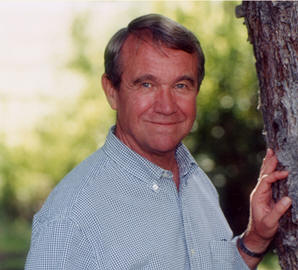 (2/4) Roger Fouts, Ph.D., professor of psychology and director of the Chimpanzee and Human Communication Institute at Central Washington State University, will be the principal speaker at the William Meredith Science and Culture Dinner and
Lecture, March 15, on the campus of Mount St. Mary’s University.
(2/4) Roger Fouts, Ph.D., professor of psychology and director of the Chimpanzee and Human Communication Institute at Central Washington State University, will be the principal speaker at the William Meredith Science and Culture Dinner and
Lecture, March 15, on the campus of Mount St. Mary’s University.
The lecture is free and open to the public and will be held at 7 p.m. in the Mount’s Knott Auditorium. The Callings Program, a collaborative effort by Mount St. Mary’s and the Lilly Endowment Fund to promote the theological exploration of vocation, is sponsoring Fouts’ lecture.
Fouts is an internationally renowned expert on the origins of communication in both chimpanzees and human beings. His research crosses many academic boundariesbiology, psychology, philosophy, language, and education.
Fouts’ own life-experience is a testament to understanding a theological exploration of vocation. As a young graduate student, Fouts planned to one day become a psychologist and work with developmentally disabled children. As an economic means to achieving this goal, he took a position as a
research assistant with two faculty members who were attempting to teach a chimpanzee American Sign Language.
What began as a part-time job grew into a calling.
Remarkably, Fouts found not only that chimpanzees could learn a human language, but that his work with chimpanzees could be applied to autistic children who, after living for years unable to communicate in any form, began to sign and then, eventually, to speak. His work in this area was the
subject of his best-selling book, "Next of Kin: My Conversations with Chimpanzees," published in 1997.
"Although Fouts’ groundbreaking work brought him much fame and recognition, the scientific community was hostile to his work," says Karl Einolf, Ph.D., professor of economics and director of the Mount’s Honors Program. "This hostility came about not only because his work challenged the long-held
assumption that there is an absolute divide between humans and our closest evolutionary relatives, but because he rejected the view that morality plays no part in setting limits to scientific inquiry."
In insisting on the humane treatment of his test subjects, Fouts found himself turning down positions at Ivy League universities and challenging the bio-medical industry. "He stood up to the scientific establishment and sacrificed much in support of his calling," says Einolf. "Not only will we
learn about our origins of communication, as is the "Callings theme" this academic year, but we will also learn from a very brave man how to follow our calling even in the face of strong opposition."
For more information, please contact the Office of Communications at 301-447-5366.